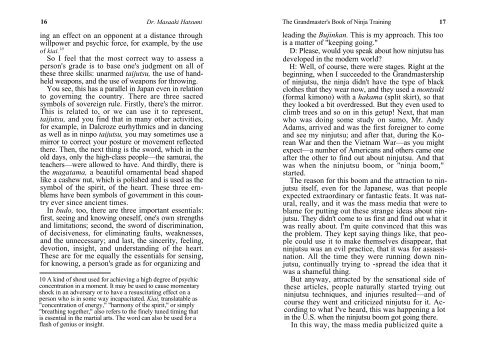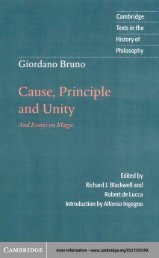Create successful ePaper yourself
Turn your PDF publications into a flip-book with our unique Google optimized e-Paper software.
18 Dr. Masaaki Hatsumi <strong>The</strong> <strong>Grandmaster's</strong> Book <strong>of</strong> <strong>Ninja</strong> Training 19<br />
mistaken notion <strong>of</strong> ninjutsu, but this gave me the<br />
opportunity <strong>of</strong> writing about the true ninjutsu, and I<br />
find it very gratifying that I have been presented<br />
with this chance. Now, I've also made some videos to<br />
show that ninjutsu is not some group <strong>of</strong> dirty or<br />
magic tricks but a well-founded system. As I have<br />
always said, it is something that well-balanced, sensible<br />
people may practice.<br />
Now we are in the midst <strong>of</strong> the second ninjutsu<br />
boom in my lifetime, and this has spread all over the<br />
world, but in fact, the real ninjutsu boom—what will<br />
be the third stage—is still to come. I think that we<br />
will have another boom, this time <strong>of</strong> the true ninjutsu.<br />
In America, Stephen Hayes has now come to understand<br />
about this, and Jack Hoban too understands.<br />
Now that Stephen is seventh dan and Jack is<br />
sixth, we're beginning to see some really fine instructors<br />
over there. And in Europe there are some excellent<br />
instructors, and then there's you, too, Doron (now<br />
at eighth dan). So now the time has come, I believe,<br />
when a true and correct understanding <strong>of</strong> ninjutsu<br />
can spread throughout the world. This is very important.<br />
And now I think that these unnecessary accidents<br />
and incidents will stop.<br />
D: What does ninjutsu have to <strong>of</strong>fer those who love<br />
martial arts?<br />
H: Well, as I've already said, a lot <strong>of</strong> people who<br />
have studied the martial arts have come to learn from<br />
me. Through long experience I have learned how to<br />
give them what they need. <strong>The</strong> most important thing<br />
for them, you see, is to let go <strong>of</strong> and lose the forms and<br />
styles <strong>of</strong> movement that they have learned in the past,<br />
so as to begin to absorb the feeling, the sensibility,<br />
that I am trying to convey. After all, there are all<br />
these various styles and techniques that people have<br />
learned—all kinds <strong>of</strong> things like kung fu and karate,<br />
judo and aikido—you know, all the various fighting<br />
styles, differing from country to country.<br />
What I'm trying to get people to do is drop their<br />
habits—the various physical habits that they have<br />
developed in practicing these styles, so that they can<br />
give all their attention to feeling, to sensitivity, and to<br />
good feeling. <strong>The</strong> combination <strong>of</strong> this feeling with the<br />
feeling <strong>of</strong> my art, the ability to unify the two—that is<br />
the important thing for such people to progress in<br />
ninpo. In each <strong>of</strong> the martial arts there are characteristic<br />
forms and practices that can transmit the right<br />
attitude and sense associated with that art, and what<br />
I want people to do is dissociate themselves from<br />
these habitual forms while coming to understand the<br />
sensibility that is part and parcel <strong>of</strong> ninpo; and in this<br />
way I am trying to transmit my art.<br />
D: Can you give any practical ways in which the<br />
way <strong>of</strong> thinking, or the way <strong>of</strong> looking at the world in<br />
ninpo, can help in a person's daily life?<br />
H: Well, what one can do is. ... Firstly, a person<br />
can learn self-control, to bring a good balance into his<br />
or her life. This is the first, the essential thing. Of<br />
course, there are people who have never learned this<br />
control and balance properly. For example, just as in<br />
the case <strong>of</strong> Christ and Judas, however wonderful a<br />
teacher may be, there's always someone among his<br />
pupils who cannot understand properly, who becomes<br />
disaffected and breaks away. So it's not a matter<br />
<strong>of</strong> just teaching everything and then expecting<br />
people to conduct themselves properly.<br />
I don't want to judge people merely on the basis <strong>of</strong><br />
their having studied under me. It all depends on the<br />
quality and feeling <strong>of</strong> the person. I think this is very<br />
important. But it's the ability to live a balanced life<br />
that I'm saying is the most important thing—the<br />
ability to conduct all aspects <strong>of</strong> one's life in a selfcontrolled<br />
manner—this is what I am looking for. I<br />
don't try to force it at all: people are free.<br />
Now, in some ways, this word "free" has a<br />
frightening aspect. A tiger, for example, is free, as<br />
in the old

















